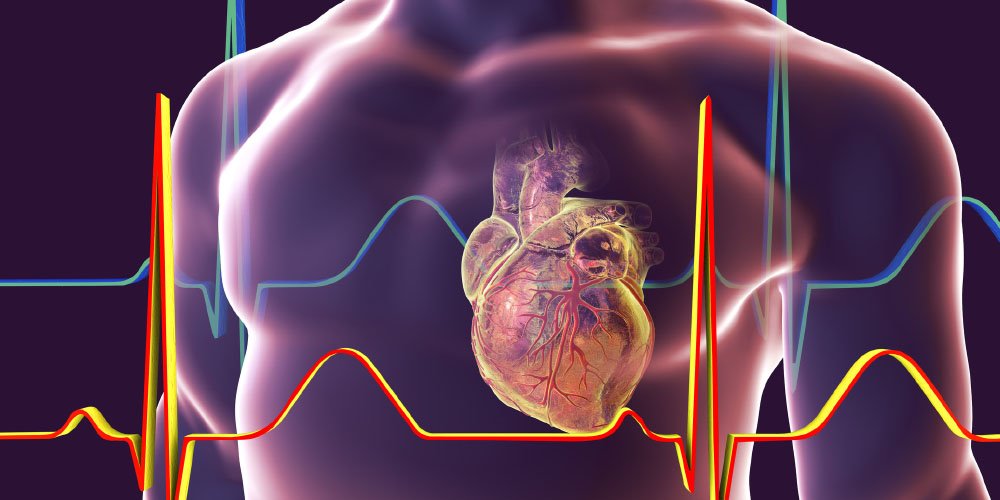deCODE Genetics and Collaborators Reveal Complex Impact of Sequence Variants on Lipid Levels and Heart Disease
15 September 2023 | Friday | News

Image Source : Public Domain
Scientists at deCODE genetics, a subsidiary of Amgen, and their collaborators from the Icelandic healthcare system and The Copenhagen University, publish a study today in the journal Cell titled "Complex effects of sequence variants on lipid levels and coronary artery disease".
The work described in the paper is based on searching for variants in the genome that associate with variance in quantitative traits and the assumption that those variants must interact either with other variants or components of the environment.
It is well established that the "bad" cholesterol (also called non-HDL cholesterol and LDL cholesterol) directly contributes to the development of cardiovascular disease.
The environment and the genome both influence bad cholesterol and consequently cardiovascular health. This influence can be complex and intertwined. For example, drinking alcohol tends to increase bad cholesterol, but the study showed that carriers of a particular sequence variant that is known to slow down the metabolism of alcohol are protected against the negative effects of alcohol consumption on coronary artery disease. Carriers of a particular sequence variants that associate with liver fat are more susceptible to increases in bad cholesterol upon consumption of oily fish than non-carriers.
Similarly, the authors show that variants in the genome interact with each other to affect cholesterol levels. The study demonstrates that homozygotes of the APOE2 allele that protects against risk of Alzheimer's disease risk are as likely to have high levels of bad cholesterol (non-HDL cholesterol) as non-carriers, but have much fewer particles carrying the cholesterol (ApoB). These homozygotes are at similar risk of developing coronary artery disease as non-carriers, demonstrating that is the amount of bad cholesterol and not the number of bad cholesterol carrying particles that confers risk of disease. Furthermore, the authors show that blood group secretor status influences cholesterol levels and cardiovascular disease risk among individuals who are not in the A1 blood group, but has no influence among those in the A1 blood group.
These examples highlight the complex and fascinating ways in which the genome and the environment interact to affect health and demonstrate that a broad range of models are required for comprehensive understanding of the genetics of human diseases.
Based in Reykjavik, Iceland, deCODE is a global leader in analyzing and understanding the human genome. Using its unique expertise and population resources, deCODE has discovered genetic risk factors for dozens of common diseases. The purpose of understanding the genetics of disease is to use that information to create new means of diagnosing, treating and preventing disease. deCODE is a wholly-owned subsidiary of Amgen (NASDAQ:AMGN).
Most Read
- Management of Relapsed/Refractory Multiple Myeloma
- 2025 Drug Approvals, Decoded: What Every Biopharma Leader Needs to Know
- BioPharma Manufacturing Resilience: Lessons From Capacity Expansion and Supply Chain Resets from 2025
- APAC Biopharma Review 2025: Innovation, Investment, and Influence on the Global Stage
- Top 25 Biotech Innovations Redefining Health And Planet In 2025
- How Health Systems Are Reshaping Drug Adoption, Partner Models, and Market Access in 2026
- The New AI Gold Rush: Western Pharma’s Billion-Dollar Bet on Chinese Biotech
- Single-Use Systems Are Rewiring Biopharma Manufacturing
- The State of Biotech and Life Science Jobs in Asia Pacific – 2025
- Asia-Pacific Leads the Charge: Latest Global BioSupplier Technologies of 2025
- Invisible Threats, Visible Risks: How the Nitrosamine Crisis Reshaped Asia’s Pharmaceutical Quality Landscape
Bio Jobs
- The State of Biotech and Life Science Jobs in Asia Pacific – 2025
- Avantor’s New CEO Ligner Aims to Unlock Global Potential and Deliver Shareholder Value
- AstraZeneca Commits $50 Billion to U.S. Expansion by 2030 in Biggest-Ever Global Investment
- Thermo Fisher, SAMRC, and South Africa’s Department of Science and Innovation Launch CATIR to Nurture Next-Gen Scientists
- Cube Biotech Appoints Former Sartorius CEO Dr. Joachim Kreuzburg to Board of Directors
- FDA’s AI Transition Marks a Turning Point in Drug Review: Industry Faces Pressure to Adapt Amid 20% Workforce Cut
- WuXi XDC Completes Mechanical Build of Singapore Bioconjugate Manufacturing Hub
News
Editor Picks











